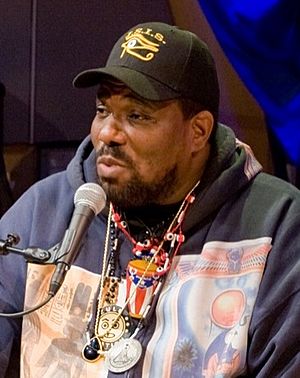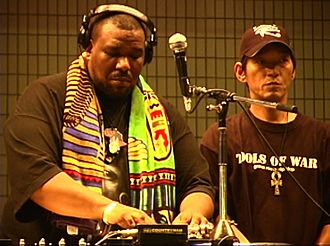Afrika Bambaataa facts for kids
Quick facts for kids
Afrika Bambaataa
|
|
|---|---|

Afrika Bambaataa in April 2009
|
|
| Background information | |
| Birth name | Lance Taylor |
| Born | April 17, 1957 |
| Origin | The Bronx, New York City, U.S. |
| Genres |
|
| Occupation(s) |
|
| Years active | 1977–2013 |
| Labels | |
| Associated acts |
|
Lance Taylor (born April 17, 1957), known by his stage name Afrika Bambaataa, is a retired American DJ, rapper, and music producer. He is famous for creating popular electro songs in the 1980s that helped shape hip hop culture. Afrika Bambaataa is considered one of the pioneers of breakbeat DJing, a style that uses parts of songs with strong drum beats.
He helped spread hip hop around the world by turning his neighborhood group, the Black Spades, into the Universal Zulu Nation, an organization focused on music and culture. In 2016, Bambaataa stepped down from his leadership role in the Universal Zulu Nation.
Contents
Early Life and a New Name
Lance Taylor was born to parents who had moved from Jamaica and Barbados. He grew up in the Bronx, New York City. His mother was an activist, and he grew up hearing many different kinds of music from her large record collection. In his neighborhood, local groups were very important. They organized community events and parties.
Bambaataa was a leader in a group called the Black Spades. He was good at bringing people together and helped the group grow.
A trip to Africa changed his way of thinking. He was inspired by the movie Zulu and the unity of the Zulu people. During his trip, he saw how strong communities could be. He decided to create a similar positive community back home. He changed his name to Afrika Bambaataa Aasim, after a Zulu chief named Bhambatha. He said his new name meant "affectionate leader."
Career in Music
The Beginning of Hip Hop Parties
Inspired by DJs like DJ Kool Herc, Bambaataa started hosting his own parties, called block parties, in the South Bronx. He wanted to use hip hop music to bring young people together in a positive way. This led him to create the Universal Zulu Nation.
He formed several rap groups, including the "Jazzy 5" and the "Soulsonic Force." These groups included many talented artists from the Zulu Nation.
Creating a New Sound
In 1982, Bambaataa started using electronic sounds in his music. He was inspired by electronic bands like Kraftwerk. He realized that technology could create exciting new music. He and his group, the Soulsonic Force, released the song "Planet Rock."
"Planet Rock" was a huge hit. It mixed electronic sounds, drum machines, and synthesizers with funk and hip hop. The song used parts of Kraftwerk's songs "Trans-Europe Express" and "Numbers." This new style of music became known as electro-funk and was played in clubs everywhere.
Spreading Hip Hop Culture
In 1982, Bambaataa and other hip hop artists went on the first-ever hip hop tour of Europe. He believed that touring was the best way to share hip hop with the world. He wanted to promote the values of peace, unity, love, and having fun. Many people say that his work helped bring peace to neighborhoods and saved lives.
He became known as the "Master of Records" because of his large and diverse music collection. He could always find the perfect beat for a party.
The Universal Zulu Nation
Bambaataa officially started the Universal Zulu Nation on November 12, 1977. It was a group for rappers, B-boys (breakdancers), graffiti artists, and anyone involved in hip hop. He started by hosting parties at community centers and high schools.
The group grew quickly. Bambaataa welcomed DJs, rappers, dancers, and artists, making them all members of the Zulu Nation. The name was inspired by the 1964 movie Zulu. The goal of the Zulu Nation was to use the creativity of young people to build a positive and powerful movement.
Gaining Recognition
In 1981, Bambaataa began performing in downtown Manhattan clubs. His parties became so popular that he had to move to bigger venues like the Ritz and the Roxy. This helped introduce hip hop to a wider audience.
After the success of "Planet Rock," he released more hits like "Looking for the Perfect Beat" and "Renegades of Funk." He also worked with many other famous musicians. In 1984, he recorded the song "Unity" with the "Godfather of Soul," James Brown.
He also appeared in the 1984 hip hop movie Beat Street. Throughout his career, Bambaataa worked to use music for good causes. He was part of the Stop the Violence Movement and helped record the song "Self Destruction" in 1989 to raise money for anti-violence programs.
In 1990, Life magazine named him one of the "Most Important Americans of the 20th Century."
Later Career and Legacy
In the 1990s and 2000s, Bambaataa continued to make music and collaborate with artists from around the world. He worked with the band Leftfield on the song "Afrika Shox" and with WestBam on an album.
His influence is still felt today. The rock band Rage Against the Machine covered his song "Renegades of Funk" in 2000.
In 2012, Cornell University made him a visiting scholar. The university is now home to his large collection of records, recordings, and papers, preserving the history of hip hop for future generations.
Selected Discography
Here are some of Afrika Bambaataa's most well-known albums and singles.
Albums
| Year | Album | Label |
|---|---|---|
| 1983 | Death Mix | Paul Winley Records |
| 1985 | Sun City | Manhattan/EMI |
| 1986 | Planet Rock: The Album | Tommy Boy/Warner Bros. Records |
| 1986 | Beware (The Funk Is Everywhere) | Tommy Boy/Warner Bros. Records |
| 1988 | The Light | Capitol/EMI Records |
| 1991 | The Decade of Darkness | EMI Records |
| 2004 | Dark Matter Moving at the Speed of Light | Tommy Boy Entertainment |
Singles
| Year | Title | Label |
|---|---|---|
| 1982 | "Planet Rock" | Tommy Boy/Warner Bros. Records |
| 1982 | "Looking for the Perfect Beat" | Tommy Boy/Warner Bros. Records |
| 1983 | "Renegades of Funk" | Tommy Boy/Warner Bros. Records |
| 1984 | "Unity" (with James Brown) | Tommy Boy/Warner Bros. Records |
| 1984 | "World Destruction" (with John Lydon) | Celluloid Records |
| 1988 | "Reckless" (with UB40) | EMI |
| 1999 | "Afrika Shox" (with Leftfield) | Hard Hands |
See also
- Can't Stop, Won't Stop: A History of the Hip-Hop Generation


